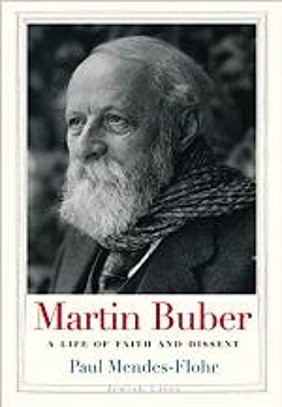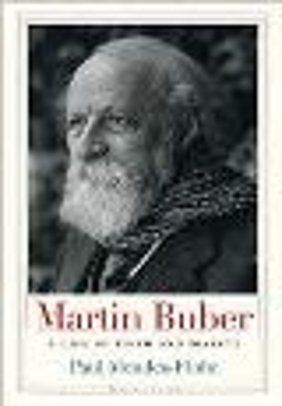Although Paul Mendes-Flohr’s Martin Buber: A Life of Faith and Dissent was just published in 2019, it has already received quite a reception. It has been reviewed in the Wall Street Journal by Benjamin Balint, the New Yorker by Adam Kirsch, and the New York Times by Robert Alter. And yet this attention has not necessarily been fortunate, as Buber’s life and thought are often trivialized in the process. Alter, for instance, acknowledges Mendes-Flohr’s “scrupulous research,” but nevertheless writes rather dismissively of Buber’s “odd” politics, and his “embarrassing … insistence on spirituality in the realm of history.”[1] And near the end of his review, Kirsch writes: “The best way to understand Buber, ultimately, may not be as a thinker but as a seeker.”[2] These reviews of Mendes-Flohr’s outstanding biography have in turn been a subject of some consternation among scholars of modern Jewish thought.[3]
Mendes-Flohr’s biography, which spans Buber’s life (1868-1965), begins with the young Martin’s abandonment by his mother when he was three years old and proceeds to detail his upbringing with his religiously observant grandparents, his youthful engagement with Zionism, his early work as a publicist and popularizer of Hasidism and mysticism, his flirtations and subsequent break with German nationalism during World War I, his role as an educator at the Freies Jüdisher Lehrhaus and the University of Frankfurt, his spiritual resistance against the Nazis with the beleaguered Jewish community in Germany and beyond, his emigration to Palestine, and finally his uneasy role as an outsider and social critic in Israel. Mendes-Flohr writes extensively—and often quite movingly—about Buber’s relationship with family and friends, and devotes significant attention to his longtime partner and later wife, Paula Buber (née Winkler), detailing among other things, her influence upon Buber’s writing and thought.
Mendes-Flohr spends time explaining Buber’s ideas about dialogue, Hasidism, Zionism, Judaism, and other topics about which he wrote at great length. However, the greatest contribution of this biography is the manner in which it situates the development of Buber’s thought vis-à-vis personal and professional relationships and the tumultuous political events that so decisively shaped his life, including the first and second world wars, the rise to power of the Third Reich, and the birth of the state of Israel. At each stage of his life, Buber encounters and interacts with prominent political and cultural figures within and beyond the Jewish community. Mendes-Flohr recounts the various public and private exchanges Buber engaged in, illuminating not only their intellectual and political stakes but also their human dimension. He also considers how these encounters and exchanges shaped Buber’s intellectual legacy. Thus, for instance, we follow the ups and downs of the young Buber’s fluctuating relationship with Theodore Herzl, his studies with Wilhelm Dilthey and Georg Simmel, his formative friendship with Gustav Landauer, his collaboration and friendship with Franz Rosenzweig, and his more fraught relationships with David Ben Gurion and Gershom Scholem. Considerable attention is also devoted to Buber’s postwar encounter with Martin Heidegger. We also learn, though not in the same depth, about Buber’s encounters with such figures as Margarete Susman, Franz Kafka, Hermann Cohen, Abraham Joshua Heschel, Paul Tillich, Albert Einstein, and Carl Rogers. In all this, Mendes-Flohr stays rigorously focused on Buber’s life, and yet uses this material to give the reader a window into the developments of twentieth century, particularly with respect to the tumultuous experience of European Jewry.
Alongside his sympathetic, though not uncritical, presentation of Buber’s life, Mendes-Flohr provides intermittent and insightful exposition of Buber’s ideas. He casts Buber’s thought in terms of an effort “to reintegrate the natural and supernatural Jew” (p. xv), using Arthur Cohen’s famous distinction to explore the unconventional and always tentative efforts of Buber to chart his own path forward as he sought to rise to the demands of the present situation before him. Thus, after an initial enchantment with possibilities for new communal modes of existence that the outbreak of World War I might open, Buber becomes steadfastly convinced that political messianism, whether in Europe or later in Israel, is not, and cannot be, the route to such a reintegration. Particularly striking was Buber’s willingness to forgo ideological and moral purity, committing himself to work with the world as he found it. This trait often vexed Buber’s contemporaries, and judging from the reviews of Mendes-Flohr’s books, it remains a source of consternation for some. This refusal to put principle over reality is on display both with Buber’s relationship to Zionism and in his engagement with the post-Nazi German world more generally.
Mendes-Flohr traces how Buber, an early proponent of cultural Zionism, finds his aspirations about the spiritual and cultural potential of Zionism to be increasingly at odds with the social and political reality on the ground. And yet, as his efforts to influence and transform Israeli policy towards the Palestinians, to foster a genuine encounter between Israelis and Palestinians, meet with failure, he refuses to wash his hands of the struggle (something he charged his friend and disciple, Hans Kohn, with doing). Instead, in his words, he sought to “truly serve the spirit” by seeking “to make good all that was once missed,” and to “free once again the blocked path to an understanding with the Arab peoples” (p. 255).
Similarly, Mendes-Flohr explores how Buber, with some reluctance, overcame his initial apprehension about returning to give talks in postwar Germany. He also illuminates the thought process that lead Buber—much to the chagrin of his friends and colleagues back in Israel—to accept several significant German awards. Not only did he donate the prize monies to various organizations tied to Arab-Israeli dialogue, but he hoped to strengthen the hand of those Germans still committed to humanistic foundations that were once the bulwark of the now extinct (in his estimation) German-Jewish symbiosis. Buber also had a fleeting encounter with the important philosopher Martin Heidegger, who was unrepentant about his affiliation with the Nazi Party. Mendes-Flohr analyzes how Buber’s notion of philosophical anthropology developed in terms of an extended debate with Heidegger’s thought. While Buber objects to the “functionalizing of truth” and draws on Heidegger’s influential rejection of the correspondence theory of truth (p. 263), he is sharply critical of the way Heidegger excludes “anthropological and hence ethical considerations from his ontological existentialism” (p. 279), in a manner that anticipates a range of late twentieth-century Continental philosophy. It is worth noting that many of the most serious thinkers who work on Jewish philosophy today are adamant about the continued importance of grappling with Heidegger’s thought, refusing outrage as an excuse to avoid his work.
At each stage of his life and career, the reader is given details of Buber’s talents, his electrifying speeches, the dramatic impression he made upon all those who encountered him in person, but also his foibles and shortcomings such as the recurring theme of his limitations in the classroom. In addition to his sheer humanity, what emerges most clearly in this biography is Buber’s intellectual integrity. Despite the impression certain recent reviews of this book might suggest, Mendes-Flohr’s biography leaves the reader with an overwhelming sense of Buber’s seriousness. At each stage of his life and career, we see Buber struggling with ambivalence, attending more to the particularities of each situation than general, abstract principles. Buber was no seeker, more style than substance, nor should he be dismissed as naïve and quixotic. Buber rejected easy answers, seeking to respond to the complexities of each situation as they presented themselves. Buber’s pioneering efforts to understand the dialogical situatedness of human beings vis-à-vis other people and the world as well as his efforts to wrestle meaning from traditional religious texts without avoiding the challenges presented by the naturalistic and historicist implications of modernity continue to speak to the problems and needs of the present moment. While detractors continue to insist upon his political naivety, Buber’s insistence—already in the late 1940s—on the urgency to face “the bitter reality” of Israeli policies toward the Palestinians cannot be so easily dismissed other than on ideological grounds (p. 257). Mendes-Flohr’s magisterially researched and engagingly written biography brings Buber to life, makes his thought urgent and present, and shows again and again how Buber the person but also the thinker remains very much our contemporary.



